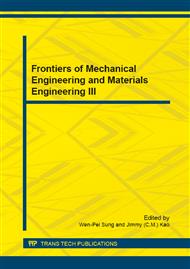p.51
p.56
p.61
p.65
p.69
p.73
p.79
p.83
p.87
Experimental Study on the Loaded Property of Waste Fiber Recycled Concrete Beam-Column Joints
Abstract:
Considering the actual factors such as axial compression ratio, constraint conditions and so on, We design 10 beam-column joints of different parameters under the condition of the same reinforcement ratio and use the monotonic loading type to study the influences of dosage of recycled aggregates and waste fibers, waste fiber length on beam-column joints on the ultimate bearing capacity of the core area. Experimental research shows that when the dosage of recycled aggregates is 50% , waste fiber content is 0.12%, waste fiber length is 19 mm, the node ultimate bearing core area best performance.
Info:
Periodical:
Pages:
69-72
Citation:
Online since:
January 2015
Authors:
Price:
Сopyright:
© 2015 Trans Tech Publications Ltd. All Rights Reserved
Share:
Citation:


